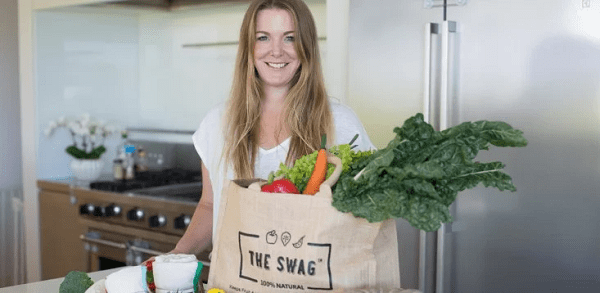While many small businesses and retailers across the country are feeling the pinch of COVID-19, reusable bag startup The Swag is thriving.
The Swag’s product range — which includes reusable teabags, dry cleaning bags, food wraps, lunch bags, grocery bags and beauty wipes — is designed to preserve the freshness of fruit and vegetables, and minimise food wastage.
Launched in 2016, the company has achieved a growth rate of about 30% year-on-year and — with customers now reluctant to go the shops amid the pandemic — the business has seen purchases increase by over 50% during the past few months.
Founder and managing director Peita Pini says while COVID-19 may affect the company’s wholesale market due to air freight costs, it won’t affect long-term plans to scale up the business.
“Sales have gone through the roof over the last few months … and less trips to the shops have definitely been a driver for those sales,” she says.
“Fruit and vegetables are key to bolstering the immune system, and people are filling their [Swag bags] with confidence that [their products] will last two weeks or more.”
After being featured in Oprah’s O Magazine last year, which also led to a significant jump in sales, The Swag has been setting the foundation for further expansion in the US and other international markets.
The business has also changed the portion of proceeds it is donating to not-for-profit Destiny Rescue — which exists to end child sexual exploitation and slavery — from 100% last financial year, to 5% this year.
“We have taken a more strategic approach,” Pini says.
“We need to be able to scale and that requires money [but] they can see how passionate we are about growing the business … which will lead to much larger donations.”
With about 100 stockists across the US and Canada and about 200 stockists across Australia, the company is currently running a marketing and sales drive in the US, and seeking a tenfold increase in growth over the next three to five years.
“We brought in great talent to join our team, reviewed our IT systems and have gone into a large research phase with UX … we have also moved to a bigger [third-party logistics provider] and were invited to go onto The View, but that was affected by COVID-19,” says Pini.
“After a year of stripping back … all of our systems and processes are in place which will enable us to expand.
“There are great things on the horizon once we get through some of the supply issues [to do with] COVID-19.”
“Like sealing flowers and selling them in plastic”
Growing up in a zero-waste home on a north-west Sydney acreage, Pini came up with The Swag after being blown away by the amount of fruit and vegetables she was throwing away.
Pini, who was working in media sales before starting the business, says she noticed condensation growing in the bags of produce in her fridge and realised the food items were trying to breathe.
“It’s like taking flowers and sealing them in plastic. You wouldn’t do that — you’d put [them] in a vase with water, and give [them] the ability to breathe and hydrate,” she says.
This realisation kick-started the process of testing, refining and developing different designs for a reusable bag, before Pini settling on three different layers of unbleached, unseeded cotton.
Pini launched the product on Facebook in 2016 with muted expectations.
“People were managing my excitement and saying that lots of people don’t get sales outside their friends and family during their first month but, by the time I got home, we had 50-60 orders from strangers,” she says.
“It showed me that many people were facing similar issues with food waste, which encouraged me to keep going.”
After selling over 60,000 Swag bags in 2018, Pini appeared on Channel Ten’s Shark Tank, which she says was more of a marketing exercise than an investment pitch.
After a heated debate with the judges over the $3 million valuation of the business, she took a $150,000 deal with the shark Glen Richards for 25% of the company.
But Pini says the deal didn’t go through.
“By the time we did our due diligence, our revenue had grown significantly and there was no use taking on that level of investment and giving away that amount of the company.
“Our valuation was accurate and [Shark Tank] didn’t put in some of the financial numbers, but that’s the drama they create around the show.
“It was a great experience, and a great marketing exercise for our product and our business.”
‘They realise the planet is sick’
Pini predicts the company’s COVID-19 sales boom will continue as consumer habits change, and Australians seek to minimise the five million tonnes of food that ends up in landfill each year.
She also says the natural product sector is booming in the US, as evidenced by the growth of Expo West — the world’s largest natural and organic products event — which has “quadrupled in size over the last two years”.
“People realise our planet is sick, we’re the ones making it sick, and we need to change our behaviour,” she says.
“Living waste- and plastic-free seems hard but, once you start doing it, it’s easier than you think.
“You feel good cooking with fruit and vegetables that are singing at you.”
This is an edited version of a story that first appeared on SmartCompany. It is republished here with permission.


